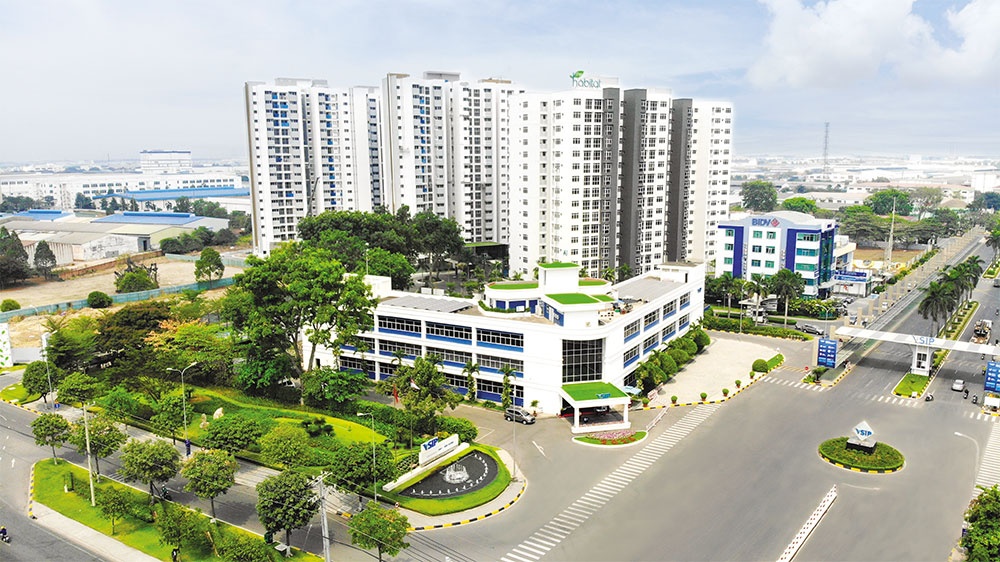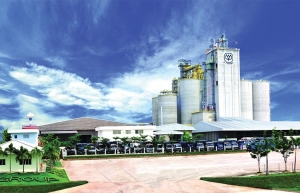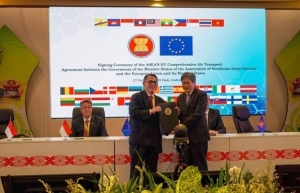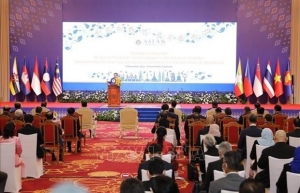ASEAN approach underpins robust investment inflow
At the 40th and 41st ASEAN Summit and Related Summits held last week in Cambodia, regional member states agreed that they should adopt a holistic approach to building a competitive funding environment, which will allow them to woo more foreign direct investment (FDI) within the bloc and from its partners of China, Japan, South Korea, Australia, and New Zealand.
 |
| Many regional investments such as Vietnam-Singapore Industrial Park have been developed in many localities throughout Vietnam, photo Le Toan |
Such facilitation should incorporate business and other measures not limited to foreign investment procedures alone. Synergies should be sought between related efforts and the activities and tools of authorities other than investment promotion agencies, the members agreed.
It should also cover business registration and approvals, licences, and other administrative requirements and processes, and tax-related and social security procedures, for example.
Investment facilitation will also be leveraged by advantages from the Regional Comprehensive Economic Partnership (RCEP). Under the deal’s commitments, member states committed to remove around 88-98 per cent of tariff lines for Vietnam, and ASEAN countries pledged to do that with 86-100 per cent of tariff lines. The longest roadmap for tariff elimination is 15-20 years from the time the RCEP became valid.
Addressing last week’s ASEAN Business and Investment Summit 2022 in Cambodia, Vietnam’s Prime Minister Pham Minh Chinh stated that ASEAN enteprises need to take all advantage of opportunities offered by the RCEP which is the world’s biggest multilateral free trade agreement covering 30 per cent of global GDP and 30 per cent of world population.
“The RCEP will help enterprises to expand markets, and develop production chains and value chains, with harmonised regulations on origins, tarfiff and customs procedures, quarrantine, and technical standards,” PM Chinh said. “Besides the RCEP, the member states need to effectively implement the ASEAN Master Plan on Industry 4.0 and the ASEAN Agreement on Electronic Commerce which can strongly help boost digital transformation, attract FDI, and facilitate regional connectivity and economic recovery.”
According to the ASEAN Investment Report 2022 jointly issued recently by the ASEAN Secretariat and the United Nations Conference on Trade and Development, it is expected that ASEAN will continue to receive a high level of FDI flows following the significant rebound.
“Despite the worsening outlook for global FDI, several factors will support continued growth, including vibrant industrial development, regional integration momentum, growing numbers of middle-income consumers, and a consistent policy push,” read the report.
The interaction of internal (for example, regional integration and market attraction) and external factors (such as adjustment or strengthening supply chain capacity, and regional corporate expansion strategies) favourable to the region will help sustain a high level of inflows, said the report.
ASEAN has recorded a robust rebound in FDI inflows, surging by 42 per cent to reach $174 billion in 2021. With a large market and strong regional integration, the bloc remains a major FDI destination in the developing world – second only to China – and will play an important role in driving global economic recovery.
“Over the past few years, member states have undertaken significant efforts to attract and retain FDI. They are now stepping up this endeavour through the adoption of an Investment Facilitation Framework in 2021, reflecting ASEAN’s continued commitment to improve ease of doing business in the region,” said ASEAN secretary-general Lim Jock Hoi.
Notably, the ASEAN Secretariat has highly appreciated the investment facilitation in Vietnam, which it said boasts great potential to attract more FDI both inside and outside the region.
“The funding environment in Vietnam has improved over the years, as corroborated by survey findings from foreign chambers of commerce based in the country,” the secretariat said. “The government has introduced measures to simplify requirements, reduce steps, and streamline processes to facilitate investment.”
Specifically, the Vietnamese government has continued to reform and take steps to further improve the country’s investment environment, including implementing resolutions and regulatory directives on strengthening information provision, simplifying processes, and reducing administrative requirements.
For example, the existing Law on Investment covers Vietnam’s efforts to attract FDI, including in certain activities such as university education, pollution mitigation, and medical research. It also addresses granting of incentives to promoted activities. Moreover, the Law on Public-Private Partnership Investment prioritises key industries such as transportation, electricity grid and power plants, irrigation, water supply and treatment, healthcare, and IT infrastructure for public-private partnerships.
Meanwhile, the ASEAN Secretariat said Decree No.31/2021/ND-CP dated March 2021 provides guidance on the implementation of the Law on Investment. It highlights efforts in creating an open mechanism, overcoming bottlenecks in business activities, strengthening local decentralisation, ensuring transparency, and providing additional incentives and special funding support.
For example, Thailand’s Siam Cement has expanded operations in Indonesia, Singapore, and Vietnam and increased its investment in retail and logistics businesses in Cambodia, Indonesia, Myanmar, the Philippines, and Vietnam. It is building a $5.1 billion petrochemical complex in Vietnam, which will be completed in 2023. In 2021-2022, Thailand’s PTT Global Chemical has also expanded operations and partnerships in manufacturing and retail activities in Cambodia, Indonesia, Laos, Myanmar, and Vietnam.
In a more specific example, Singapore’s Sembcorp Development received a licence to develop the 12th Vietnam-Singapore Industrial Park in the Mekong Delta city of Can Tho.
As of October 20, registered investment capital into Vietnam from South Korea stood at $80.61 billion, with Singapore at $70.4 billion, Japan at $68.34 billion, China at $22.6 billion, and Thailand and Malaysia each around $13 billion.
As the biggest overseas investor in Vietnam, Samsung is boosting the completion of its $230 research and development centre in Hanoi, which is expected to become officially operational soon. It is estimated that this group has pumped over $18 billion in Vietnam so far and it is now also planning to pour an additional $3.3 billion in the country. Samsung has set a target of earning an export turnover of $69 billion this year, up from $65.5 billion last year.
Meanwhile, Japanese investors are also hunting for more opportunities in Vietnam. Last year, some registered to fund the O Mon II thermal power project, with total registered capital of $31 billion and in the Vina Kraft Paper Factory with $611.4 million. Meanwhile, Sumitomo Group is working on phase II of Thang Long Industrial Park in the northern province of Hung Yen and the Van Phong 1 build-operate-transfer thermal project.
According to Vietnam’s Ministry of Planning and Investment, Vietnam received $17.45 billion in disbursed FDI in the January-October 20 period, up 15 per cent on-year. It is expected that the figure will rise to $22 billion for the whole year, up 11.5 per cent from 2021.
Registered FDI, which indicates the size of future disbursements, including newly registered capital, further investment in current projects, and stake acquisition, decreased 5.4 per cent on-year to $22.46 billion. Of the pledges, 57.5 per cent would go to manufacturing and processing. Singapore was the top source of FDI pledges in the period with $5.34 billion, followed by Japan ($4.2 billion) and South Korea ($3.9 billion).
Vietnam currently has nearly 35,900 active foreign-invested projects registered at $435.2 billion.
 | Fresh connections reinforce trade facilitation in ASEAN With the full liberalisation of trade within the ASEAN Economic Community, businesses from regional nations have capitalised on the bloc’s trade facilitation with a view to expanding investment and exports to Vietnam, while the country has also followed suit with other regional markets. |
 | ASEAN, EU sign world’s first bloc-to-bloc air transport agreement The ASEAN, European Union (EU) and their member states signed the Comprehensive Air Transport Agreement (ASEAN-EU CATA) at the 28th ASEAN Transport Ministers’ Meeting in Bali, Indonesia on October 17. |
 | Cambodian scholar highlights Vietnam's contributions to ASEAN Summits Vietnam has always been an active and responsible member of the Association of Southeast Asian Nations (ASEAN) and coordinated with Cambodia to contribute to the success of the 40th and 41st ASEAN Summits and Related Summits, which just concluded in Phnom Penh, a Cambodian scholar has said. |
What the stars mean:
★ Poor ★ ★ Promising ★★★ Good ★★★★ Very good ★★★★★ Exceptional
Related Contents
Latest News
More News
- US firms deepen energy engagement with Vietnam (February 05, 2026 | 17:23)
- Vietnam records solid FDI performance in January (February 05, 2026 | 17:11)
- Site clearance work launched for Dung Quat refinery upgrade (February 04, 2026 | 18:06)
- Masan High-Tech Materials reports profit: a view from Nui Phao mine (February 04, 2026 | 16:13)
- Hermes joins Long Thanh cargo terminal development (February 04, 2026 | 15:59)
- SCG enhances production and distribution in Vietnam (February 04, 2026 | 08:00)
- UNIVACCO strengthens Asia expansion with Vietnam facility (February 03, 2026 | 08:00)
- Cai Mep Ha Port project wins approval with $1.95bn investment (February 02, 2026 | 16:17)
- Repositioning Vietnam in Asia’s manufacturing race (February 02, 2026 | 16:00)
- Manufacturing growth remains solid in early 2026 (February 02, 2026 | 15:28)

 Tag:
Tag:



















 Mobile Version
Mobile Version